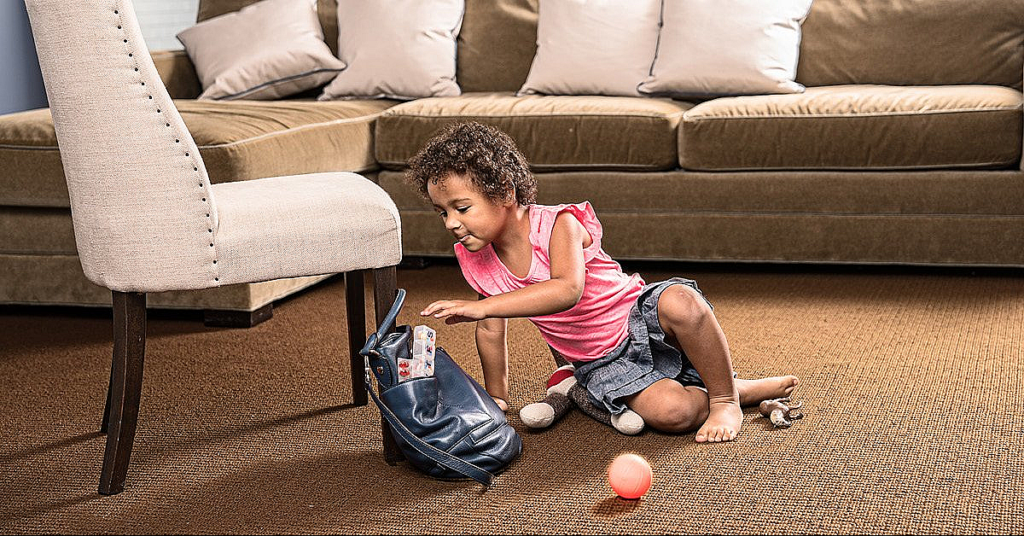Cecelia Grant, 66, suffers from a few medical problems. Last August, her three-year-old grandson managed to get into her pocketbook that she placed on her daughter’s couch. Thankfully, Cecelia spotted the boy trying to open a plastic baggie that contained her diabetes and high blood pressure medications which she kept in her purse. She quickly managed to snatch the bag away from the child. “I don’t know what I would have done if my grand would have taken those pills! When I think of what could have happened to my baby boy, I feel sick,” says the Teaneck, New Jersey resident.
Accidental, pediatric drug poisonings are dangerous and sometimes lethal. One of the most common ways children accidentally get ahold of dangerous drugs is from Grandma’s purse. This phenomenon is pretty common, in fact, it is often referred to as “Grandma Purse Syndrome,” poisonings that occur resulting from grandparent’s meds that are ingested by young children when the drugs are left within reach.
A whopping 80% of the grandparents polled by the National Poll on Healthy Aging say they keep their medication in the same place as usual when their grandchildren visit their house — and 72% keep them in their purse or bag when they go to visit their grandchildren. Accidental poisonings in children are a daily occurrence in the U.S., and one of the most common sources of these poisonings is Grandma’s or Grandpa’s medications.
A study conducted by the Long Island Poison Center found that about two of every ten medicine poisonings in children involved grandparents’ prescription drugs. Most of these poisonings, caused by what the study participants called the “Granny Syndrome,” involve children gaining easy access to grandparents’ medications that had been left on a table or countertop (46%), on low shelves (29%), in grandmother’s purses (17%), or in a cabinet or higher shelf more than 36 inches from the floor (8%).
Young children are particularly susceptible to the ingestion of poisons, especially liquids, because they are very inquisitive, put most items in their mouths, and are unaware of consequences. Younger children are more susceptible to poisoning because of their smaller size and less well-developed physiology.
The typical meds that grandparents carry around are prescriptions to treat such serious ailments as heart conditions, diabetes, anti-depressants, and high blood pressure. These types of medications are usually the ones that cause the most harm to children if ingested. Many seniors do not even know the names or dosages of the meds they take and may refer to their drugs as “water pills,” “diabetes pills,” or “high blood pressure pills.”
Not knowing the names of prescriptions taken only makes it harder for a doctor to determine the proper treatment if a child ingests a drug. “Prescription medicines, and even over-the-counter medicines and supplements, can harm children and teens who find them in grandma’s purse,” says Preeti Malani, M.D., the National Poll on Healthy Aging’s director. “No matter how old your grandchildren are, you need to think about medication safety.”
The Institute for Safe Medication Practices (ISMP) and poison centers recommend tips on how to avoid tragedies related to “Grandma Purse Syndrome:”
- Avoid keeping medicines in purses, tote bags, backpacks where children can explore
- If you do carry your meds, hang the carrier on a hook or shelf that makes it impossible for children to reach it
- Make sure your meds have child-resistant caps or containers and close them after each use.
- Keep in mind that “child-resistant” does not mean “child-proof.” Don’t take a chance by leaving medicines on counters or tables (including children’s vitamins or iron supplements), even if they have child-resistant caps or containers.
- Many poisonings occur when seniors are ready to take their meds, place them on counters, or tables and then become distracted.
And lastly, Dr. Malani cautions, “If you put your pills into day-of-the-week pill sorters so you can remember whether you took your medicine each day, that’s great — but keep that sorter out of the reach of little ones. Make sure you explain to them, and their parents or older siblings, that it’s important to stay away from your medicines — that those pills are for you and you alone.” She also notes that grandparents should make sure to have the national Poison Control number, 1-800-222-1222, stored in their phone, memorized or available.
For information on the Institute for Safe Medication Practices’ consumer website, go www.consumermedsafety.org.
